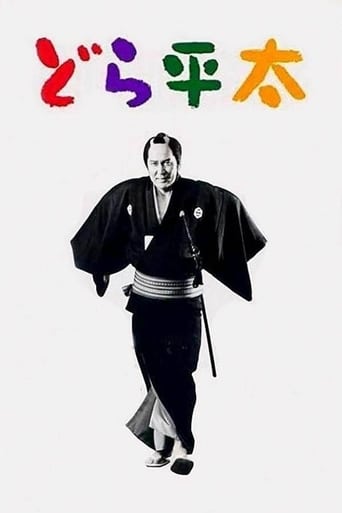MartinHafer
This film begins with a new magistrate being appointed. He's apparently the fourth appointed in the last year in this film set in the feudal period in Japan. Past magistrates were frustrated by the in-grained corruption and gave up--but this one is a bit different--he ALREADY is corrupt."Dora-heita" was an enjoyable film but I can't help but think that I was always expecting more--like there would be some amazing resolution to make it all magical or at least more interesting. That's because you know that the incompetent debaucher is going to eventually spring his trap and reveal himself to be a gifted and powerful foe. But, while this eventual unveiling occurs, it all just seemed quite anticlimactic. Also, the action, sometimes was pretty good (such as when Dora-heita fought guys with swords with only his bare hands or a knife), at other times seemed a bit second-rate as well. And, oddly, there wasn't any blood. Overall, it's okay...
El_Farmerino_Esq
As a random pick from the shelves of a Japanese DVD store, largely chosen simply on the basis of having English subtitles and the words 'Kon Ichikawa' in big roman letters, the list of names attached to Dora-heita comes as quite a surprise, though it never really stacks up against the best work of any of its four writers. Which is not to say it's a bad film; far from it. It is, though, a rather uneven one...The story is solid enough; Mochizuki Koheita is the newly appointed magistrate in a small rural fiefdom, sent to clean up the corrupt town of Horisoto in his own unorthodox way, facing off against a trio of gang bosses and the complacent and complicit council. In the lead, Koji Yakusho plays the part perfectly, making Koheita both genuinely likable and credibly hard-nosed. Support ranges from the fairly good to the utterly mediocre, though none of the actors come off too badly. The strongest scenes of the film are those set in the streets of Horisoto, Mochizuki's first visit to the slum being the most striking sequence in terms of visual flair. Elsewhere, there are a few great scenes; the visit to Nadahachi's abode in particular, despite the paint-by-numbers action scene that follows.It's certainly a film with plenty to keep the viewer's attention, but it never really coagulates into a sleek, unified whole. There are problems with some of the comedy elements and with the Kosei character, both of which feel as though they were shoehorned in at the last minute, in the misguided fear of putting off viewers with too serious a story. In actual fact, it would probably be possible to cut Kosei out completely; contrary to expectations, she actually has no connection at any point to the main thread of the story, instead providing only a couple of laughs, an underwhelming brawl with some smugglers and a penultimate scene that errs the wrong side of ridiculous.Still, it's entertaining enough, though it'd be best not to have too high expectations simply because of the names on the screenplay...
deng43
someone calls this a detective story, and that is apt. the film reminds me very much of an American detective tale, something hammett might have written, but it is effortlessly translated into another world, one of swords and sake. there is one point, a night shot, when the magistrate has first entered the corrupt town he is to clean up, and the camera catches faces that reek of depravity, hopelessness, vacancy; these are the seedy, misbegotten, down-and-out characters of a low rent street of burst dreams; it is an almost noir shot of the underbelly. for a moment you are in some other movie, a bleaker seemingly more modern place where concrete hems the characters in and no escape exists. it is a very western shot in the value judgments it makes for the viewer. the shot is jarring and you never have to ask again why this place needs to be cleaned up.the main characters come off with a western outlook quite often. the geisha who tracks the magistrate is a regular hell-on-wheels girl who knows about life and has the bit in her teeth - maybe almost a harlow part. the magistrate really lacks the veneration and gravity you will find in any similar Japanese movie that features clans, a hierarchy, bushido, men of status and the formality normally associated with samurai society. the protagonist is a trickster and an irreverent scoffer. it is nearly sam spade looking for lew archer's killer.i found the flic to be a really nice mix of western attitudes and samurai story in a comedic melange that was not in the least bit overdone or offsetting.i give it a seven because i didn't "love" the movie, but i did like it a lot and will watch it again.
Killer-40
Remember Koji Yakusho from SHALL WE DANCE, UNAGI (THE EEL), CURE or TAMPOPO? The Japanese box-office star is the new magistrate in a corrupt town who spreads rumours about his negligence and dubiosity only to get rid of all the bad guys he has to face and who underestimate him then completely. Dora-heita is an example for a streetwise and easy living guy with the classic abilities of a samurai - although he is making fun of them. The sword fighting seems to be classic but is hidden in camera movements, cuts and other tricks because Yakusho hasn't got the presence and fighting abilities of a Toshiro Mifune. The film was planned long ago by the four famous directors Kurosawa, Kinoshita, Kobayashi and Ichikawa who formed Yonki-no-kai (The Committee of Four Knights) in 1969 and wrote the script together. Only after three of them had died, Ichikawa could finally make his 74th movie out of their script.

